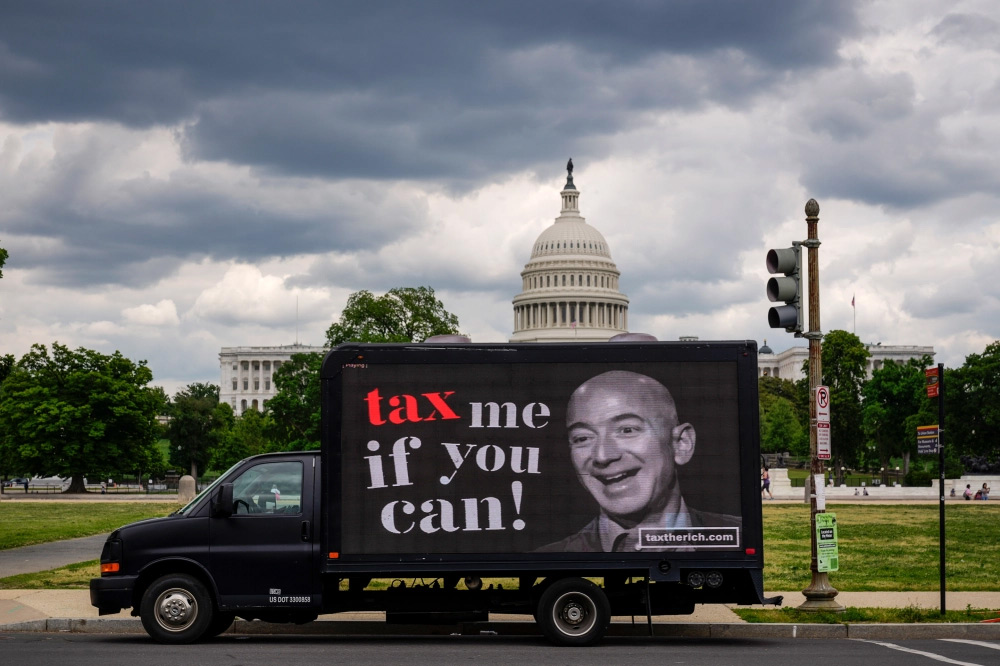拜登用了什么招,让贝佐斯没法再偷税?

和亿万富翁们的收入相比,他们向国家缴纳的税款几乎是沧海一粟。这一点丝毫不让人意外,但令人意外的是他们的避税手段:周二,调查新闻网站ProPublica详细披露了美国25位亿万富翁是如何做到的。这也是美国总统拜登提出一项关键税收议案的论据——对所谓的“未实现资本收益”征税。长期以来,超级富豪们一直以此为由,避免他们在死后还要被征税。
曝光的内容揭示了这些亿万富翁向美国国税局报告的收入以及他们的资产增值,即所谓的“未实现的资本收益”。大多数经济学家认为,这种“未实现的资本收益”也是一种收入,即使根据美国现行的法律,这部分资产不需要被征税。
例如,如果某人去年的净资产为400万美元,今年为500万美元,经济学家会说,这个人一定获得了至少100万美元的收入。但是,如果该人的净资产仅是因为资产升值而增加,那么根据税收规则,那100万美元就不会被计为收入。
根据税收规则,只有当资产所有者出售资产时,“资本收益”才会被计为“收入”,此时,增值的数额会算作出售资产的利润,也即所谓的“已实现”资本收益。像沃伦•巴菲特、杰夫•贝佐斯、迈克尔•布隆伯格和埃隆•马斯克这样的亿万富翁只要牢牢地把资产掌握在自己手里,就可以轻而易举地避免缴纳所得税。
这个隐秘的点是非常重要的。例如,ProPublica的文章显示,他们调查了贝佐斯五年的财务状况,在这段时间里,他向美国国税局报告了42亿美元的收入,以大多数衡量标准来看,这确实是一笔可观的收入。但在此期间,贝佐斯的资产增值了990亿美元。因此,经济学家会说,贝佐斯在五年内的收入超过了1000亿美元,但他只给国家缴纳了42亿美元的税。他缴纳的联邦税收在其真实总收入中的占比都不到1%。
税务专家早就知道富人可以通过这种方式避税,但就如何解决这一问题,他们常常存在分歧。大部分人的收入来自工作,每年,这部分个人所得都要被征税。然而富人每年的大部分收入却都不用纳税,这也使他们的资产能以更快的速度增长。
例如,在2015 年,美联储官员大卫•S•米勒解释说,巴菲特当时的净资产接近700亿美元,而如果每年都对他的资本收益征税,无论他是否出售资产,他的身家就只会剩下95亿美元。
米勒指出,解决这个问题的最好方法是改变税收规则,每年将“未实现的资本收益”作为收入的一部分,纳入征税范围,这种方法称为“按市值计税”。参议院财政委员会主席罗恩•魏登(Ron Wyden)对此十分赞同,并于2019年发布了一份白皮书,呼吁进行这项改革。
现行税法还会给“未实现的资本收益”提供另一条问题更大的避税途径:某人死亡后,其资产就能永远免税。这就是税收中所谓的“递增基数”。即如果某人终生持有这些资产,并在去世后把资产留给他们的继承人,那这些富人们就永远不需要为他们持有资产的升值部分缴纳所得税了。
在计算出售资产的资本收益时,用的是纳税人出售资产的价格减去一个基数——通常是购得资产时支付的价格。对继承人来说,在他们继承资产之日,这一基数就“递增”到继承资产的价值中。以税法的规则来看,在传给继承者之前积累的“未实现资本收益”都忽略不计、不用纳税了。
为了确保富人最终要为他们的所有收入都缴纳所得税,国会起码必须废除这种“递增”式税基的规则,并对富人去世后的“未实现收益”征税。
拜登已将这项改革作为其《美国家庭计划》中税收部分的一项条款。如果某人死亡时未实现资本收益超过100万美元(已婚夫妇为200万美元),他将对此征税。此前,房屋收益也是可以免税的例外,现在,新的征税规则将同样适用于这部分资产。
这项提议的反对者称,如果对资产持有者死亡时的资本收益征税,将迫使人们出售家族农场和家族企业。这种说法站不住脚。政府表示,除非这些农场和企业不再是由家庭所有和家庭经营,否则,征税对象不会包括此类农场和企业,而在后一种情况下,纳税人可以在15年内缴纳税款。
对该提案的反对声并不是为了农场主和小企业主的利益;而是为了保证像巴菲特、贝佐斯、布隆伯格和马斯克这样的人永远不必像中产阶级家庭那样,所有收入都要被征税。国会至少必须通过拜登提议的改革,否则ProPublica曝光的一切都不会带来任何重大的变化。(财富中文网)
史蒂夫•沃霍夫(Steve Wamhoff)是美国税收和经济政策研究所的联邦税收政策部主任。
编译:陈聪聪
和亿万富翁们的收入相比,他们向国家缴纳的税款几乎是沧海一粟。这一点丝毫不让人意外,但令人意外的是他们的避税手段:周二,调查新闻网站ProPublica详细披露了美国25位亿万富翁是如何做到的。这也是美国总统拜登提出一项关键税收议案的论据——对所谓的“未实现资本收益”征税。长期以来,超级富豪们一直以此为由,避免他们在死后还要被征税。
曝光的内容揭示了这些亿万富翁向美国国税局报告的收入以及他们的资产增值,即所谓的“未实现的资本收益”。大多数经济学家认为,这种“未实现的资本收益”也是一种收入,即使根据美国现行的法律,这部分资产不需要被征税。
例如,如果某人去年的净资产为400万美元,今年为500万美元,经济学家会说,这个人一定获得了至少100万美元的收入。但是,如果该人的净资产仅是因为资产升值而增加,那么根据税收规则,那100万美元就不会被计为收入。
根据税收规则,只有当资产所有者出售资产时,“资本收益”才会被计为“收入”,此时,增值的数额会算作出售资产的利润,也即所谓的“已实现”资本收益。像沃伦•巴菲特、杰夫•贝佐斯、迈克尔•布隆伯格和埃隆•马斯克这样的亿万富翁只要牢牢地把资产掌握在自己手里,就可以轻而易举地避免缴纳所得税。
这个隐秘的点是非常重要的。例如,ProPublica的文章显示,他们调查了贝佐斯五年的财务状况,在这段时间里,他向美国国税局报告了42亿美元的收入,以大多数衡量标准来看,这确实是一笔可观的收入。但在此期间,贝佐斯的资产增值了990亿美元。因此,经济学家会说,贝佐斯在五年内的收入超过了1000亿美元,但他只给国家缴纳了42亿美元的税。他缴纳的联邦税收在其真实总收入中的占比都不到1%。
税务专家早就知道富人可以通过这种方式避税,但就如何解决这一问题,他们常常存在分歧。大部分人的收入来自工作,每年,这部分个人所得都要被征税。然而富人每年的大部分收入却都不用纳税,这也使他们的资产能以更快的速度增长。
例如,在2015 年,美联储官员大卫•S•米勒解释说,巴菲特当时的净资产接近700亿美元,而如果每年都对他的资本收益征税,无论他是否出售资产,他的身家就只会剩下95亿美元。
米勒指出,解决这个问题的最好方法是改变税收规则,每年将“未实现的资本收益”作为收入的一部分,纳入征税范围,这种方法称为“按市值计税”。参议院财政委员会主席罗恩•魏登(Ron Wyden)对此十分赞同,并于2019年发布了一份白皮书,呼吁进行这项改革。
现行税法还会给“未实现的资本收益”提供另一条问题更大的避税途径:某人死亡后,其资产就能永远免税。这就是税收中所谓的“递增基数”。即如果某人终生持有这些资产,并在去世后把资产留给他们的继承人,那这些富人们就永远不需要为他们持有资产的升值部分缴纳所得税了。
在计算出售资产的资本收益时,用的是纳税人出售资产的价格减去一个基数——通常是购得资产时支付的价格。对继承人来说,在他们继承资产之日,这一基数就“递增”到继承资产的价值中。以税法的规则来看,在传给继承者之前积累的“未实现资本收益”都忽略不计、不用纳税了。
为了确保富人最终要为他们的所有收入都缴纳所得税,国会起码必须废除这种“递增”式税基的规则,并对富人去世后的“未实现收益”征税。
拜登已将这项改革作为其《美国家庭计划》中税收部分的一项条款。如果某人死亡时未实现资本收益超过100万美元(已婚夫妇为200万美元),他将对此征税。此前,房屋收益也是可以免税的例外,现在,新的征税规则将同样适用于这部分资产。
这项提议的反对者称,如果对资产持有者死亡时的资本收益征税,将迫使人们出售家族农场和家族企业。这种说法站不住脚。政府表示,除非这些农场和企业不再是由家庭所有和家庭经营,否则,征税对象不会包括此类农场和企业,而在后一种情况下,纳税人可以在15年内缴纳税款。
对该提案的反对声并不是为了农场主和小企业主的利益;而是为了保证像巴菲特、贝佐斯、布隆伯格和马斯克这样的人永远不必像中产阶级家庭那样,所有收入都要被征税。国会至少必须通过拜登提议的改革,否则ProPublica曝光的一切都不会带来任何重大的变化。(财富中文网)
史蒂夫•沃霍夫(Steve Wamhoff)是美国税收和经济政策研究所的联邦税收政策部主任。
编译:陈聪聪
It is no surprise that billionaires pay little in federal taxes relative to their incomes, but the level of detail provided by ProPublica Tuesday about how 25 billionaires pulled this off is astonishing. It is also an argument for one of President Joe Biden’s key tax proposals—taxing so-called unrealized capital gains that millionaires and billionaires have long avoided paying taxes on when they die.
The exposé presents the income these billionaires report to the IRS as well as their asset appreciation, which is called unrealized capital gains. Most economists consider unrealized capital gains to also be a type of income, even though it is not taxed under our current laws.
For example, if someone’s net worth was $4 million last year and is $5 million this year, an economist would say that person must have had income of at least $1 million. But if that person’s net worth grew only because their assets appreciated, tax rules do not count that $1 million as income.
Tax rules count capital gains as income only if and when the owner of an asset sells it, at which point the appreciation is calculated as the profit from the asset sale, also called a “realized” capital gain. Billionaires like Warren Buffett, Jeff Bezos, Michael Bloomberg, and Elon Musk can avoid paying income tax by simply holding on to their assets.
This arcane point is hugely consequential. For example, the ProPublica article reveals that Bezos reported $4.2 billion in income to the IRS during the five-year period examined, a substantial sum by most measures. But Bezos’s assets appreciated by $99 billion during that period. So, an economist would say that Bezos had income of more than $100 billion over five years, but he paid federal taxes only on $4.2 billion. Federal taxes as a share of his true total income over that period come to less than 1%.
Tax experts have long known that rich people are able to avoid taxes in this way, but they do not always agree on how to address it. Most people get their income from work, and this earned income is taxed each year. The ability of the wealthy to avoid paying taxes on most of their income each year allows them to grow their income at a much more rapid rate.
For example, in 2015 David S. Miller explained that Buffett, whose net worth was nearly $70 billion at that time, would have been worth $9.5 billion if his capital gains had been taxed each year regardless of whether he sold assets.
Miller points out that the best way to address this is to change the rules to include unrealized capital gains as income for tax purposes each year, an approach called mark-to-market taxation. The chairman of the Senate Finance Committee, Sen. Ron Wyden, agrees, and issued a white paper in 2019 calling for this reform.
The tax code provides another even more problematic tax break for unrealized capital gains by exempting them forever when individuals die. This is the so-called stepped-up basis. The appreciation of assets held by wealthy people is never subject to income taxes if those assets are held until the holders die and are left to their heirs.
To calculate a capital gain after selling an asset, the basis, which is usually the price the taxpayer paid to purchase the asset, is subtracted from the sale price he or she received for the asset. For heirs, the basis is “stepped up” to the asset’s value on the day they inherited it. The unrealized capital gains that accumulated before the asset was passed to them simply disappear as far as the tax code is concerned.
To ensure that the wealthy eventually pay income taxes on all their income, Congress must at the very least repeal the stepped-up basis rule and tax unrealized gains of wealthy individuals when they die.
Biden has included this reform as one of the revenue-raising provisions in his American Families Plan. He would tax unrealized capital gains exceeding $1 million ($2 million for married couples) at death. Additional exclusions for gains on a home also would apply.
Opponents of Biden’s proposal to tax capital gains at death claim that it would force the sale of family-owned farms and family-owned businesses. This is not true. The administration has stated that it would not include such farms and businesses unless they stop being family-owned and family-operated, at which point taxpayers could pay the tax over 15 years.
Opposition to the proposal is not about farms and small businesses; it is about ensuring that people like Buffett, Bezos, Bloomberg, and Musk never have to pay taxes on all their income the way that middle-class families do. Congress must enact Biden’s proposed reform, at a minimum, or else nothing revealed by the ProPublica exposé will change in any significant way.
Steve Wamhoff is the director of federal tax policy at the Institute on Taxation and Economic Policy.













